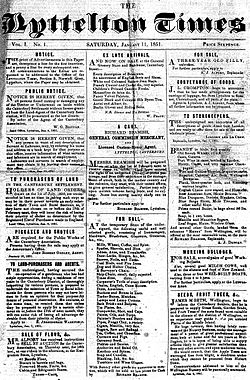Lyttelton Times

Cover of the first edition of the
Lyttelton Times |
|
| Type | Daily newspaper |
|---|---|
| Format | Broadsheet |
| Founded | 11 January 1851 |
| Ceased publication | 29 June 1935 |
| Headquarters |
Lyttelton Times Building, 56 Cathedral Square, Christchurch |
The Lyttelton Times was the first newspaper in Canterbury, New Zealand, publishing the first edition in January 1851. It was established by the Canterbury Association as part of its planned settlement of Canterbury and developed into a liberal, at the time sometimes seen as radical, newspaper. A successor paper, The Star, is published as a free bi-weekly newspaper.
James FitzGerald was the newspaper's first editor, and it was FitzGerald who in 1861 set up its main competitor, The Press, over the Lyttelton Times' support for the Lyttelton Rail Tunnel. In 1935, it was The Press that won the competition for the morning newspaper market in Christchurch; the Lyttelton Times was the oldest newspaper in the country when it ceased that year.
The Canterbury Association was formed in order to establish a colony in what is now the Canterbury Region in the South Island of New Zealand. Part of the plan was to have a newspaper, and a prospectus was published in August 1850. The Canterbury Association entered into a contract with Ingram Shrimpton, of the Crown Yard Printing Office, Oxford, to send out the necessary plant in one of the First Four Ships to Lyttelton. The printing equipment arrived on the Charlotte Jane on 16 December 1850, and the first edition of the Lyttelton Times was published less than one month later on 11 January 1851.
The press was first installed in a shed on Norwich Quay. John Ingram Shrimpton, Ingram Shrimpton's son, came out on the Charlotte Jane with some staff for the newspaper and was manager and canvasser.James FitzGerald was the first editor for the Lyttelton Times, and had agreed to work for free. One of the early contributors to the newspaper was John Robert Godley.
Ingram Shrimpton came out from England in 1854 and took over as editor. FitzGerald had effectively relinquished the editorship upon his election as Superintendent of the Canterbury Province in July 1853. The production moved to more spacious premises in Lyttelton's Oxford Street in 1854. In July 1856, Shrimpton sold the newspaper to Charles Bowen and Crosbie Ward for £5000. Ward became editor and showed great talent in running the newspaper. When he lost his seat in Parliament in 1866, he could devote himself full-time to journalism and was regarded as Canterbury's best satirical writer.
...
Wikipedia
